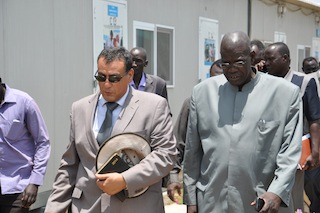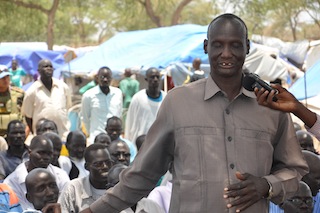Displaced in UN camp mock Jonglei governor, express support for rebels
March 30, 2014 (BOR) – Internally Displaced Persons (IDPs) living inside the United Nations mission camp in Bor mocked the Jonglei state’s caretaker governor Lt. Gen. John Kong Nyuon during his visit on Saturday, shouting pro-rebel slogans and throwing stones.

Clashes in the South Sudan capital Juba between rival members of the army preceded Nuer civilians being targeted shortly after the government accused Macahr of attempting a coup. This has been denied by Machar and his co-accused.
Fighting spread to Jonglei, as well as Unity and Upper Nile states, where soldiers defected to join the rebellion along with armed youth. Civilians from other ethnic groups have also been targeted during the conflict.
Soon after the governor started to speak to the IDPs in the camp hundreds of young men arrived shouting “Riek Machar Oyee”, interrupting the governor’s speech. Others threw stones at the government delegation in an attempt to force them to leave.
As well as the 5,694 people in the Bor camp, the UNMISS are sheltering 6,797 people in Bentiu, 21,500 in Malakal and 32,000 others in Juba.
The 67,390 civilians in UNMISS camps constitute just a fraction of the over one million people who have been displaced in the conflict. Some estimates say that around 10,000 people have died but there are no accurate figures.
Nuer civilians in the camp say it is too dangerous for them to leave.
The rebels have demanded that the Ugandan military, which intervened on the side of the South Sudanese army withdraw as a precondition for peace talks resuming.
The displaced people in the Bor camp also insisted that they would not leave until the Uganda People Defence Force (UPDF) had left the area.
The Governor was accompanied by his newly appointed deputy, Baba Medan and some cabinet ministers including the minister of agriculture, Mayen Ngor; the minister of cabinet and parliamentary affairs, Gai Riam; the minister of health, Jehan Michek; and the minister of finance and economic planning, Aquila Maluth.
The government delegation was received at the gate by the acting UN coordinate for Jonglei state, Yusef Abueljedian.
“I came to see the difficulties you are in” the governor said at a meeting with those living in the camp.
“There was wrong interpretation of this war, some people said it was between Nuer and Dinka. I say no, it wasn’t. People who tell you that people are being killed in Juba now, are lying. Yes people were killed when this war started, but those who are in the UN camp in Juba normally go for shopping, spend some days at homes and return to the camp as they wish,” he said.
Some stones were thrown at the governor but none of them appeared to hit him. However, the chairperson of the Jonglei peace commission, James Apay was hit by a stone.
DISPLACED DEMAND SALARIES
Speaking on behalf of the displaced people in Bor, Chief William Tut asking that the state government to release the salaries for all those who were forced to seek shelter in the camp.

He also asked that people be granted free movement in and out of the UN camp and to allow traders to bring in goods, including firewood, charcoal, dry fish and other consumer goods.
“Why are we not paid in [this Protection of Civilians unity] here in Bor, it is because we are Nuer? People in the displaced camp in Mingkaman were paid,” Tut asked the government officials in the meeting, referring to the mainly Dinka displaced camp across the White Nile in neighbouring Lakes state.
Many people inside the UN camps and those who have sided with Machar’s rebels – the SPLM in Opposition – have been removed from the Jonglei state pay role.
The governor denied that their salaries had been withheld but said they would need to to report themselves to the authorities either in person or over the phone.
Some people managed to get their salaries paid to either to them directly or to their relatives in Juba through Mabor Bol, one of the Lou Nuer men who was present at the time in Jonglei state coordination office in Juba according to the officials who spoke at the meeting.
They accused the government soldiers of beating the traders (both Dinka and non-Dinka) who have supplied the camps with dry fish and firewood.
SECURITY SITUATION
The displaced people complained of bad security situation in the camp, accusing government soldiers of killing those who attempt to leave the camp.
William Tut gave examples to illustrate his community’s frustration.
“On the 13th of this month, Chuol Nyang was grabbed by the government soldiers in front of eastern gate. Again on 14th at 9 a.m, a lady with Dinka name, Adut Deng Ajing, she is from Bahr el Gahazal, was taken away by the soldiers. She came back late in the evening. William Deng Bichok was killed near the airport some days back. He was a medical doctor,” he continued.
“If the young men want to join the rebels, let them join. What do you think will prevent them,” he added.
The state government promised the displaced people that they would look into some of their demands.
(ST)
